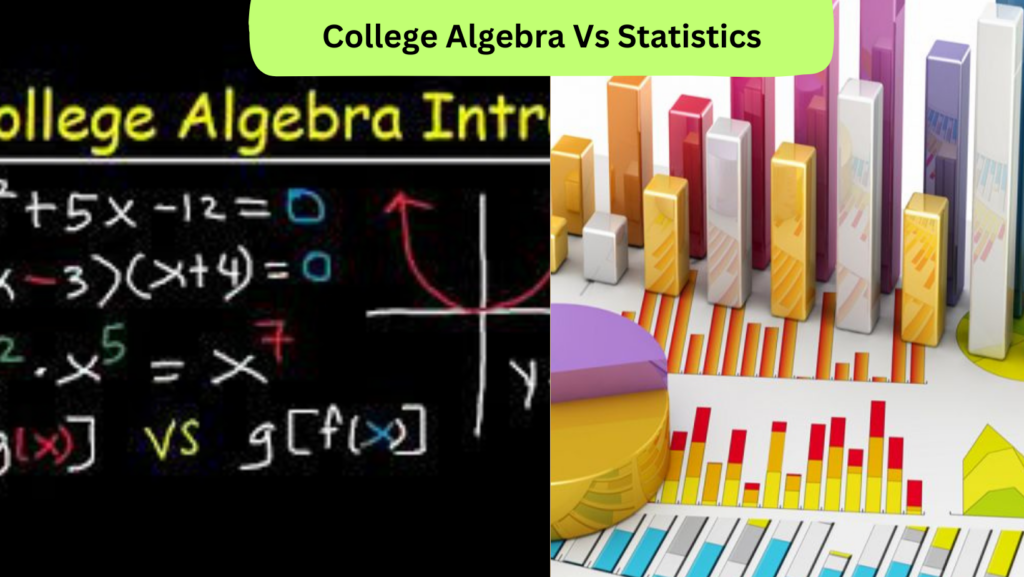The decision between College Algebra Vs Statistics stands as a pivotal crossroads, each path offering a unique journey through numerical landscapes. As students step into the realm of higher education, the world of mathematics unfolds before them, often presenting choices that can lead to moments of contemplation.
In this exploration, we will dissect the intricacies of both disciplines, uncovering their applications, challenges, and the ways they shape our understanding of the quantitative world.
Contents
Understanding the Foundation: College Algebra
College Algebra: A Prelude to Mathematical Fluency
College Algebra, as the title suggests, serves as a foundational stepping stone in the realm of mathematics. It introduces students to equations, functions, and graphs, equipping them with the tools to understand and manipulate algebraic expressions. The journey commences with a deep dive into essential concepts like linear equations, quadratic functions, and exponential growth. With each step, students unlock the power to decipher and solve real-world problems that hinge on mathematical reasoning.
The Logic of Equations and Inequalities
One of the crown jewels of College Algebra lies in its ability to enhance logical reasoning. It equips learners with the skills to decipher complex equations and inequalities, offering insights into scenarios that extend from personal finance to scientific phenomena. By grasping the essence of algebraic relationships, students sharpen their analytical abilities, cultivating a mindset that transcends the confines of numbers and infiltrates various domains of decision-making.
Statistics: Illuminating Patterns in Data
Statistics: The Art of Data Interpretation
On the other side of the mathematical spectrum stands Statistics, a discipline that unveils the secrets hidden within data. In an era dominated by information, the art of interpreting and deriving meaning from data becomes paramount. Statistics provides the tools to collect, analyze, and interpret data, thereby facilitating informed conclusions and predictions.
The Power of Descriptive Statistics
Descriptive statistics form the bedrock of data analysis. They allow us to summarize and present data in ways that are understandable and meaningful. Mean, median, and mode transform raw data points into insights that guide decision-making. Imagine deciphering consumer preferences through survey results or assessing academic performance through test scores – all thanks to the prowess of descriptive statistics.
Inferential Statistics: Predicting the Future
Statistics takes an intriguing turn with inferential statistics, where we move from understanding existing data to making predictions about future outcomes. This involves understanding probability, hypothesis testing, and confidence intervals. Through inferential statistics, we answer questions like: Can a new drug truly outperform the existing medication? Can election polls accurately predict outcomes? The world of inference is a captivating blend of mathematics and intuition.
The Crossroads: Choosing the Right Path
At the crossroads of deciding between College Algebra and Statistics lies a pivotal moment, necessitating thoughtful consideration of your academic and career aspirations. If the intricacies of equations and the allure of deciphering mathematical logic intrigue you, then College Algebra might serve as your guiding compass, nurturing your mathematical curiosity.
Conversely, if the prospect of unveiling hidden patterns within data and forecasting trends ignites your imagination, Statistics could emerge as your guiding star, propelling you into the world of data-driven insights and predictive analysis. Ultimately, this choice should harmonize with your innate interests and future goals, shaping your educational journey in alignment with your passions.
The Symbiosis: Where They Converge
In the realm where College Algebra and Statistics converge, an essential symbiosis emerges. While these disciplines maintain their distinct identities, their paths frequently intersect, mutually reinforcing comprehension. A robust grounding in College Algebra fortifies the adept manipulation of equations within statistical realms, forging a bridge between abstract algebraic concepts and practical data analysis.
In return, the insights derived from statistical exploration infuse real-world significance into algebraic abstractions, breathing life into equations by relating them to tangible phenomena. This harmonious interplay between College Algebra and Statistics not only enriches the learning experience but also showcases the interconnectedness of mathematical concepts across domains.
Conclusion: College Algebra Vs Statistics
In the grand tapestry of academia, the choice between College Algebra Vs Statistics is not a fork in the road, but rather a selection that sculpts your intellectual voyage. Whether you choose to unravel the mysteries of equations or decipher the stories hidden within data, remember that the beauty of mathematics lies in its diversity – a diverse array of branches, each contributing to our understanding of the world through unique lenses.
FAQs: Unveiling the Intricacies
Q1. Which course is more challenging – College Algebra or Statistics?
Both courses come with their challenges. College Algebra can be demanding in terms of grasping abstract concepts, while Statistics may require a strong analytical mindset. The perceived difficulty often depends on personal strengths and interests.
Q2. Are there real-world applications for College Algebra?
Absolutely! College Algebra finds applications in various fields, including engineering, physics, computer science, and finance. It provides the mathematical groundwork for understanding complex relationships and solving problems.
Q3. Can Statistics be useful in everyday life?
Certainly! Statistics empowers you to critically assess information, make informed decisions, and understand trends around you. From interpreting poll data to evaluating medical research, statistical skills are highly applicable.
Q4. Can I take both College Algebra and Statistics?
Certainly, if your academic program allows it. The combination of algebraic manipulation skills and statistical analysis proficiency can be a powerful asset in various disciplines.
Q5. Which course offers better career prospects?
Both College Algebra and Statistics open doors to numerous career paths. College Algebra is fundamental in STEM fields, while Statistics is crucial in data science, market research, economics, and more. The choice depends on your interests and career goals.






